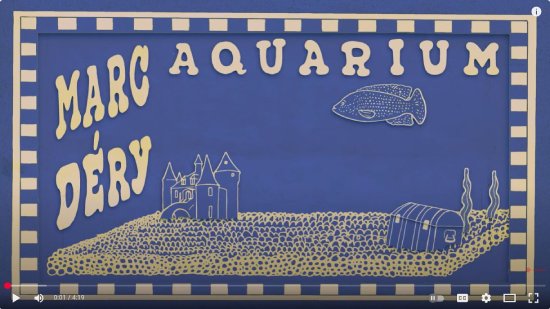Marc Déry is in the right place. J’aime ça quand t’es là, his sixth solo album, is imbued with a tremendous sense of freedom, reminiscent of his seminal first solo project, released more than 25 years ago.
 “I felt good. I felt in the right place,” says Déry who’s obviously happy, if not ecstatic, when we join him on the phone. “It was the same thing for the first album. Back then, anything was possible. All I had to do was pick any idea I felt like, because I didn’t have any constraints because of who I was, since no one really knew me outside of being a member of Zébulon. I’ve always felt that way afterward, but never as much as I did for this album. The pandemic created a sense of re-set. I think everybody kind of re-set. We could start our lives over as we wished, and the same thing happened with music.”
“I felt good. I felt in the right place,” says Déry who’s obviously happy, if not ecstatic, when we join him on the phone. “It was the same thing for the first album. Back then, anything was possible. All I had to do was pick any idea I felt like, because I didn’t have any constraints because of who I was, since no one really knew me outside of being a member of Zébulon. I’ve always felt that way afterward, but never as much as I did for this album. The pandemic created a sense of re-set. I think everybody kind of re-set. We could start our lives over as we wished, and the same thing happened with music.”
This new album comes to us six years after its predecessor, Atterrissage, and Déry enlisted the help of several musicians – including rapper Imposs (on the surprising and brilliant “Kekchose”), drummer Joseph Perrault, and producer and multi-instrumentalist Pierre-Luc Cérat, who helped him co-write nearly all the songs. “I’d worked with him for the last third of Atterrissage, and I felt that together, we were in the right place. I felt like working on an entire album with him right from the get-go. I felt our collaboration would be very fruitful.”
Working out of the same recording complex as before, in Montréal’s Pointe-Saint-Charles neighbourhood, Déry and Cérat got to know each other better while chatting about music. “He would stand outside having a smoke while I went to get something at the corner store,” says Déry. “We could also hear what the other was tinkering with. When we finally sat down with a guitar, one day, we didn’t even need to talk. We just made each other naturally better. That’s rare… I experienced that with the Zébulon guys, but I haven’t really found it very often since. As soon as there’s a spark, the other adds kindling, and the next thing you know, you’ve got yourself a big, beautiful bonfire.”
As jam sessions came and went, Déry and Cérat – previously best known as a member of Bran Van 3000 – built grooves and “interesting chord progressions.” And as soon as they had sufficiently good raw material, Déry would start working on a melody and words that were improvised organically. Déry started singing “Tombé dans l’aquarium/Comme une statuette de Bouddha” (freely: “Sank into the aquarium / Like a tiny Buddha”) on what would become the album’s first single, “Aquarium.”
“It all came straight from the subconscious,” he says. “The more I wrote, the faster I got, just enough to sketch out the melody. The result was pretty hazy, really trippy, and fucked-up. Then I’d start shaping it into something more refined, like [in the case of ‘Aquarium’], with a chorus that begins, ‘I love when you’re around.’ It gives the impression that I’m lost in my thoughts [in the verses], before suddenly turning to someone professing my love very directly; but a universal kind of love, not too cheesy, something you could say to a lover, sure, but also to a brother, a friend, or a parent.”
The lyrics on J’aime ça quand t’es là shimmer with light and a deep sense of plenty. Déry opens up with charm and flair. “I ran the emotional gamut while creating this album,” he says, “but what I wanted to get out, to show the world, was a more luminous side. We wrote 32 songs, all told, and I could’ve released a much darker album, or even a bubblegum pop album, but I didn’t want that. I wanted something luminous, yet deep, not something too naive or candid.”
The two songs that stand out, at least lyrically, are “Le dégel” and “À soir c’est sûr ça scille.” “One of my friends took his own life,” says Déry. “That’s what those songs are about, but I still wanted to have some hindsight, and a degree of positivity. I didn’t want to convey only grief.”
That artistic choice is intricately linked to how Déry sees life now, at 61. “I have an optimistic tendency, even when things go wrong,” he says. “When something crappy happens, I take a step back and breathe. I try not to fall into the trap of stressing out and losing it. When there are knots in a rope, there’s no point yanking on it; you’re better off taking the time to slowly untie them.”
Wise words from a man at peace with himself, and with the act of creating music.
